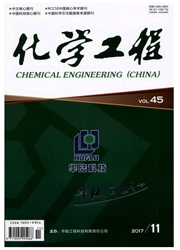

 中文摘要:
中文摘要:
工业生产中常采用碱催化酯交换法制备生物柴油,但原料油中的游离脂肪酸和水分往往会导致产生较多的皂化物,影响生物柴油和甘油的分离,降低了生物柴油的产率。开发的新型生物柴油催化剂SXL较好地解决了上述问题。以精制菜籽油和甲醇为原料,采用液相色谱法跟踪分析生物柴油(脂肪酸甲酯)的质量分数,考察新型催化剂SXL作用下的酯交换反应动力学,并研究该酯交换反应的影响因素,得到相关动力学参数。研究结果表明:在40—60℃,反应速率随反应温度升高而增大;催化剂与菜籽油质量比为2.2%时反应速率较快,产率较高;醇油摩尔比为16∶1时,在较短时间内可达到较高产率;通过假设求证得到催化剂SXL作用下的酯交换反应整个过程是从二级反应向零级反应转变,反应的平均活化能为35.33 kJ/mol,频率因子k0为4.73×105 L/(mol.min)。
 英文摘要:
英文摘要:
In industrial production,biodiesel is prepared through transesterification with alkali as catalyst.Raw materials may contain a little amount of free fatty acids and moisture,which leads to the production of more fat soap and affects the separation between biodiesel and glycerol,and thus reduces the yield of biodiesel.A new type biodiesel catalyst SXL was developed,which solved the above problems.The kinetics of transesterification catalyzed by new type catalyst SXL was investigated by using the refined rapeseed oil and methanol as raw materials,and the mass fraction of biodiesel(fatty acid methyl ester) was traced and analyzed by high performance liquid chromatography.The influence factors of the transesterification were studied,and relevant kinetic parameters were obtained.The result shows that reaction rate increases at 40-60 ℃;when the mass ratio of catalyst to rapeseed oil is 2.2%,the reaction has a result with faster rate and higher yield;when alcohol-oil mole ratio is 16 ∶ 1,higher production rate can be reached in a relatively short time.The transesterification under the role of SXL is a transformation process from second-order to zero-order,and the average activation energy of reaction is 35.33 kJ/mol,frequency factor k0 is 4.73×105 L/(mol·min).
 同期刊论文项目
同期刊论文项目
 同项目期刊论文
同项目期刊论文
 期刊信息
期刊信息
